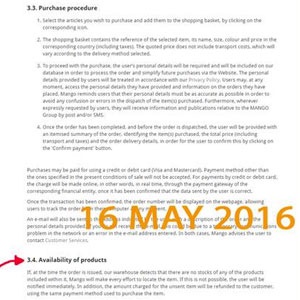
On Monday, fashion brand Mango experienced a technical glitch on their website. Instead of the intended 50% off sale, some items, such as lace panties, were mistakenly advertised for as little as R1.
Customers flooded the e-commerce site once the news broke on social media to take advantage of what they thought was a ridiculously good offer.
Yesterday, Mango sent emails to their customers to inform them that their orders had been cancelled and they would be receiving refunds.
Many customers shared their disappointment on social media and wondered whether the company was still liable to give them the goods they had ordered.
READ: Mango angers consumers after R1 "panty" glitch
Many users pointed out that Mango’s terms and conditions changed after the glitch to include a paragraph on “refusal of order” and said that this shouldn’t apply to the items they bought before the terms and conditions were updated.
We asked cyber law expert, Wilmari Strachan of Werksmans Attorneys, to give us her opinion.
“I looked at s23 of the CPA (Consumer Protection Act) which deals with disclosure of price of goods. Normally this section would dictate that a retailer must sell an item (or sales item) at the displayed or marked price, however, this section does NOT apply to online transactions. Section 23 of the CPA does not apply to a transaction if section 43 of the Electronic Communications and Transactions Act (ECTA) applies.
“ECTA would governs (sic) online transactions. ECTA states, amongst others, that the full price of the goods and any terms of agreement (including return, exchange and refund policy) must be provided to a consumer on its website – this must be provided before the consumer places the order. The terms of the transactions cannot be changed afterwards.
“Notwithstanding the above, the general principles of a sale contract would apply to any online sale contract as well. In other words, offer and acceptance. The question would be, did Mango offer something for sale at a particular price and did the consumer accept that offer (and even paid for it)? If that is the case (an offer was made and accepted) then a binding sale was concluded that cannot be unilaterally cancelled by the seller. The purchaser would be entitled hold the seller to the contract.”
Strachan also says that if the “refusal of order” paragraph had been there when customers made the purchases, then those customers would not really have a claim.
“But since it wasn’t, it looks like they entered into a binding contract with Mango. Their terms mention "The products offered" and " The items offered on this Webpage”… in other words, it’s clear that they made an offer which consumers could accept. Thus, an offer and acceptance took place.”




 Publications
Publications
 Partners
Partners










